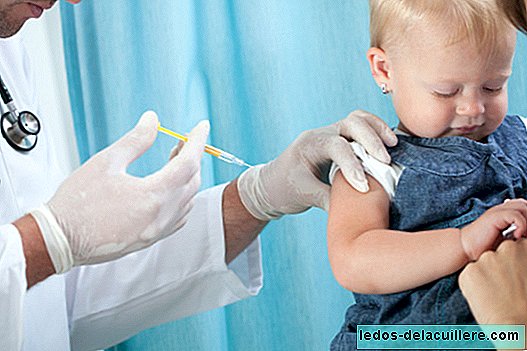
Every time the first boogers arrive, many children stop drinking cow's milk because their parents believe, or because someone has told them, that when children drink dairy they have more mucus and get worse. As a treatment, they stop giving them and replace it with oat milk, soy, rice or nothing in particular, and all without need because cow's milk consumption does not produce mucus. Come on, that drinking milk or eating yogurts does not cause a child to have more mucus than he has.
I talked about this three years ago, but a few days ago I was looking for bibliography about it to see what the scientific studies say and I leave you with what I found below (if someone finds studies that say otherwise, please, comment on them) .
What science says about the relationship between milk and mucus
The first study I am going to comment on is the one I like most of all. It dates from 1993 and it studied the relationship between milk and mucus giving milk to one group of people and soy milk to another. The investigated people did not know what milk they were drinking and those who delivered it either (double blind). In the two groups there were people who believed that milk created mucus and people who believed there was no relationship. The group that drank cow's milk noticed increased secretions in the mucous membranes and reported it. The problem is that those who took soybeans also noticed the same, there being no significant differences between the two groups: that is, or both generate boogers or neither do.
 In Babies and more Why babies who drink breast milk do not need to eat yogurts or drink cow's milk
In Babies and more Why babies who drink breast milk do not need to eat yogurts or drink cow's milkIn another study with 60 adult volunteers, they were exposed to a rhinovirus so that everyone had cold symptoms. They took samples of mucus daily, asked how much milk they had consumed (some did not drink any milk and others drank up to 11 glasses a day) and finally compared the results. They saw that milk consumption did not objectively vary the amount of mucus, although it is true that those who had the belief that milk produced mucus complained that they had more cough when drinking milk (this can be explained by the nocebo effect). They concluded that there is no relationship between milk consumption and mucus.
The following article is a question in the magazine Le Médecin de famille canada where, after seeing that the parents of asthmatic children avoided giving them milk so as not to aggravate asthma with the production of mucus, they asked about the need to remove the milk. The answer was that to date there was no scientific evidence of it and that in the absence of these data the recommendation was to give 2 servings of milk (half a liter) to children aged 2 to 8 years and 3-4 portions (750 ml to 1 liter) to children aged 9 to 13 years to help their development, even asthmatics.
In the last article I tell you about the hypothesis that there is a relationship between milk and mucus. They do not carry out the study, but explain that at the colon level there is an increase in intestinal mucus after milk consumption. They believe that this could also happen with respiratory cells and that doing in vitro tests could prove or disprove said hypothesis. If it were positive, it would be necessary to assess the possibility that it would also happen to a person, since the consumption of milk and its digestion and assimilation could not cause the same effects as in vitro work. In spite of everything, they suggest that there could be people with more sensitivity to the components that cause mucus in the intestine and that perhaps they do increase the production of mucus when drinking milk. In any case, they talk about unproven hypotheses, so the link between one thing and another remains unproven.
 In Babies and more Allergy to cow's milk proteins, mediated by IgE and not mediated by IgE: differences, symptoms and prognosis
In Babies and more Allergy to cow's milk proteins, mediated by IgE and not mediated by IgE: differences, symptoms and prognosis But it causes me an increase in mucus

You may tell me that "ok, science says no, but me". I am not going to contradict anyone. The last thing I'm looking for is to deny anyone's symptoms, but Studies to date have failed to prove that there is a relationship between milk and mucus and the logical thing is to say, therefore, that such relationship does not exist.
It is possible, as they comment in the last article, that there are people with sensitivity to some component of the milk and that these people do increase mucus production, but this would have to be tested to be able to affirm it and, even if it were true, sure that the number of people with these symptoms is minority (if not the studies would give other results); In addition, there would also be symptoms at the digestive level, most likely, and then it would not be said "milk produces mucus", but "milk feels bad".
Consequently, it is recommended that parents Let's not make changes in the diet of our children when they have colds, or make them when they are not cold ("I do not give milk so that it does not start to have mucus"), and if they normally drink milk, continue taking it as usual, which is a food that is very rich and that helps the growth and development of children (such as most food). Moreover, even at Harvard University they recommend the two daily rations that are usually recommended to the entire population.
 In Babies and more The seven most common food allergies in babies and children
In Babies and more The seven most common food allergies in babies and childrenPhotos | Thinkstock
In Babies and more | Dairy products in infant feeding: cow's milk, Milk is the first cause of allergy in children, What are the respiratory viruses that most affect children












